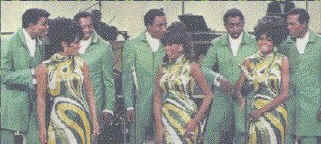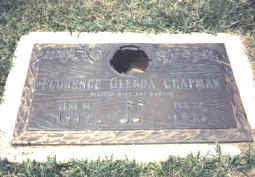
Supremes and Temptations
ith "Stop! In the Name of Love," the Supremes became the first group to have four number ones in a row on the Billboard Hot 100. The song also reached number 2 R&B and number seven in England. The Supremes began on the historic Motown Revue tour through Europe. It was while on this tour this tour that the Supremes developed their hand motions (resembling a traffic cop stopping oncoming car) for "Stop! In the Name of Love" in the men's room of a London TV studio with the help of Berry Gordy and the Temptation's Paul Williams and Melvin Franklin prior to a live appearance.
"Back in My Arms Again, on June 12, 1965, became the Supremes fifth #1.
Not only were the Supremes competing head on with the British invasion, they were becoming superstars in the realm of pop entertainment. On July 29, 1965 they headlined New York's famous Copacabana nightclub.
The same month "Nothing But Heartaches" was released and broke the string of number ones, only reaching #11. But it was a short lived decline; "I Hear a Symphony" reached number one on November 20th.
In early 1966 they had hits with "My World is Empty Without You" (#5) and "Love is Like a Itching in My Heart" (#9). "You Can't Hurry Love" reached #1 on September 10, 1966 which began a new string of #1s that included "You Keep Me Hanging On," "Love is Here and Now You Are Gone," and "The Happening".
"The Happening" was the last of ten #1s written by Holland-Dozier-Holland for the Supremes. They left Motown to form their own labels, Hot Wax and Invictus.
"Over a period of time, favoritism surfaced, which I believe had something to do with the romantic link between Berry Gordy and Diana Ross"
Carolyn Gill of the Velvelettes
By now the friction between Ballard and Ross had taken its toll and Ballard missed twoshows in Montreal and New Orleans. Part way through the Supremes appearance at the Flamingo Hotel in :Las Vegas Ballard was fired by Gordy and replaced by Cindy Birdsong of the Bluebelles.
"Initially there was a phone call - someone from Motown's office asked me to audition as a replacement for one of the Supremes. I didn't know who it was. I actually thought it was a joke. It surprised me, but I got on a plane and went straight over to Berry Gordy's house. The Supremes were in a meeting in another room and I was waiting outside. Then Florence came walking through the living room in tears and that's what made me know that it was her they wanted me to replace" .... Cindy Birdsong
Gordy now renamed the group Diana Ross and the Supremes. Though Diana was gaining stature on her way to a solo career, the new lineup was not nearly as successful saleswise. Over the next two years twelve singles were released with only "Love Child" reaching number one.
The groups first two singles "Reflections" (#2) and "In and Out of Love" (#9) were carryovers from the Holland-Dozier-Holland days.

The group did several good remakes with the Temptations. "I'm Going to Make You Love Me" was one of them.
Diana grew more and more estranged from us. We even stopped recording together. If we were in town just for one day during a tour, Diana would do all the leads and then the studio group would do all the back-up vocals when we left. And that really built up alienation.
"Someday We'll Be Together," issued in October 1969, became the Supremes last number one record, the trios last record together, and they performed it in the last of twenty appearances on the Ed Sullivan Show. Also, it was the last song they sang together when they appeared at the Frontier Hotel in Las Vegas on January 14, 1970. Then while on stage Ross introduced her replacement Jean Terrell.
On March 7, 1970 the Jean Terrell led Supremes reached the Billboard charts with "Up the Ladder to the Roof" (#10) and proved the name still had power even without Ross. In fact, their Right On album with Terrell did better (#25) than the double live farewell album with Ross (#46).
The new Supremes third single "Stoned Love" (#7 pop) was a million seller in 1970, and became the Supremes eighth number one on the R&B charts.
In June 1972, Birdsong left for home and family and was replaced by Lynda Lawrence, who was followed by a succession of replacements that included Sherrie Payne, Birdsong again, and Susaye Greene.

On December 1976 Mary Wilson left and was replaced by Karen Jackson. The Supremes last pop single was "You're Driving My Wheel" (#85 1976), and the group was soon disbanded. Florence Ballard, after leaving the Supremes in 1967, did two singles for ABC Records and then spent several years fighting Motown in a lawsuit over her firing. She lost the suit and spent sometime on welfare attempting to support her three children. Overweight and despondent, Ballard died of a heart attack at Monte Carmel Mercy Hospital in Detroit at the age of thirty two.
The driven and aggressive Ross realized her every dream as a superstar performer and actress of the 70s and 80s. She had forty-one Hot 100 hits and her movie career included roles in Lady Sings the Blues and The Wiz.
Mary Wilson went on to form her own group Mary Wilson and the Supremes, with Karen Jackson and Karen Ragland.
In May 1983, she, Ross, and Birdsong reunited for Motown's 25th anniversary TV show.
In 1984, Wilson wrote her story Dream Girl: My life as a Supreme.
On February 8, 2021, Mary Wilson died in her sleep from hypertensiveatherosclerotic cardiovascular disease at her home in Henderson, Nevada, a suburb of Las Vegas, at the age of 76.
Former Ladies of the Supremes
The number one female group had 18 Hot 100 hits as the Supremes, nine as Diana Ross and the Supremes, three as Diana Ross and the Supremes and Temptations, twelve as the Supremes after Ross left, and two as the Supremes and the Four Tops. Obviously, the whole was always greater than its parts to its fans, and the Supremes sound as good at the end as they did when the hits first started.
Mary Wilson died in her sleep at her home in
Henderso, Nevada February 2021 at the age o76. The cause
of was Atherosclerosis.
Betty McGlown died of diabetes Junuary 12, 2008 at Beaumont
Hospital in Royal Oak, Michigan at the age of 66.
Betty Martin died March 4, 2020 at the age of 76.
Florence Ballard died February 22, 1976 caused by coronary
thombosis, a clot in a coronary artery, at the age of 32.
The Supremes were inducted into the Rock and Roll Hall of Fame in 1988.
![]()